CRMs have moved from being optional tools to an essential part of how U.S. businesses manage their leads and customer relationships.
Today, about 74% of companies in the U.S use a CRM, and by 2030 the global market is projected to grow beyond USD 160 billion.
With such rapid adoption and growth, the question is no longer whether to use a CRM—but which one to choose. To help, here’s a breakdown of the 7 best CRM software in the U.S. and what each brings to the table.
How to choose the best CRM software for your business
Here are five key factors that matter most to businesses of all sizes when choosing CRM
1. Ease of implementation & adoption
A CRM is only useful if your team can use it smoothly. Look for platforms that are easier to set up, intuitive for new users, and backed by strong onboarding resources and customer support. CRMs that are easy to adopt reduce friction and help teams see results faster.
2. Automation & custom workflows
Choose CRMs that allow you to automate repetitive tasks and adapt workflows to your unique business processes.
3. Integration with U.S.-preferred tools
A CRM solution rarely works in isolation. Choose platforms that integrate with tools your team already uses (be it Google Workspace, Microsoft 365, Slack, Zoom, and other essential apps). Strong integrations help unify data and streamlines your workflows.
4. Scalability & pricing
Your CRM should scale as your business grows. Look for platforms that accommodate everything from small teams to enterprise-level deployments, and consider how pricing scales with your usage. Transparent pricing and predictable costs are especially important for businesses, where companies range from lean startups to multi-department enterprises.
5. Compliance & Security
Data privacy and regulatory compliance are critical. Depending on your industry, ensure your CRM meets U.S. standards such as CCPA, HIPAA, and SOC 2, and includes security features like encryption, access controls, and audit logs.
7 Best CRM Software in the U.S.A
1. LeadSquared

LeadSquared simplifies sales, marketing, and support by bringing all customer-facing operations into one AI-powered platform. It’s ideal for businesses aiming to scale quickly without complicating their workflows.
Pros
- Its AI features automatically assess conversion propensity, ranking leads by their likelihood to close. This helps sales teams prioritize the most promising opportunities while also surfacing upsell and cross-sell potential.
- Leads can be captured and managed from multiple channels, including websites, ads, messaging apps, social media, calls, and field events.
- The mobile app allows teams to stay productive from anywhere.
- Dashboards can be customized to track key metrics and provide actionable insights at a glance.
- It integrates seamlessly with a variety of third-party apps to expand CRM capabilities.
- Repetitive tasks can be automated, freeing up the team to focus on high-value activities.
- The AI assistant, Lexi, provides smart reminders, call sentiment analysis, and tailored talking points to make sales interactions more effective.
- Integration with LeadSquared’s Marketing Automation, Communication, and Service modules creates a unified ecosystem and reduces silos across teams.
- The customer support team is highly rated for smooth onboarding, quick resolutions, and ongoing guidance.
Cons
- There is a learning curve due to the platform’s extensive feature set.
- Pricing might be higher for smaller teams.
Pricing
- Sales Pro: $60 per user/month
- Sales Super: $100 per user/month
2. HubSpot Sales Hub
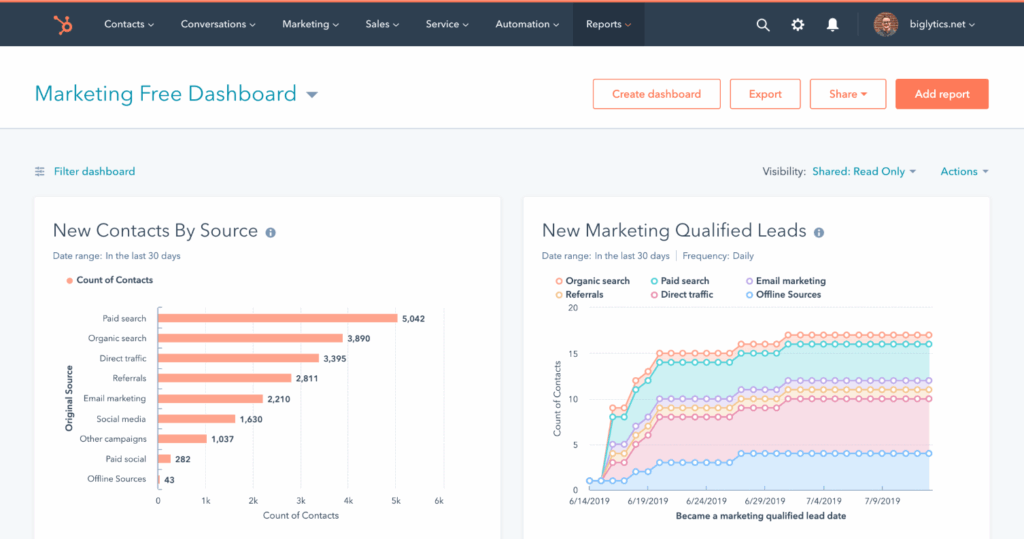
HubSpot is best known for its marketing automation platform, with a built-in CRM that extends into sales. The Sales Hub helps businesses keep their pipelines organized, automate routine tasks, and maintain strong customer connections. It’s a good fit for teams looking for efficiency and ease of use, without the complexity of a steep learning curve.
Pros
- The interface is user-friendly, which simplifies onboarding and daily operations for teams of all sizes.
- Automation features, including email sequences and task workflows, help streamline sales processes and reduce manual work.
- Advanced reporting and analytics allow teams to monitor sales performance and forecast revenue accurately.
- Integration with HubSpot’s Marketing and Service Hubs provides a unified view of all customer interactions.
- The extensive marketplace offers over 300 integrations, allowing businesses to connect with a wide variety of third-party applications.
- Customer support is strong, with a comprehensive knowledge base and dedicated assistance when needed.
Cons
- Higher-tier plans can be expensive, which may be a challenge for smaller teams.
- Some advanced features are only available in the more expensive plans.
- Customization options may be more limited compared to more complex CRMs.
Pricing
- Sales Hub Professional: $90 per user/month
- Sales Hub Enterprise: $150 per user/month
3. Pipedrive
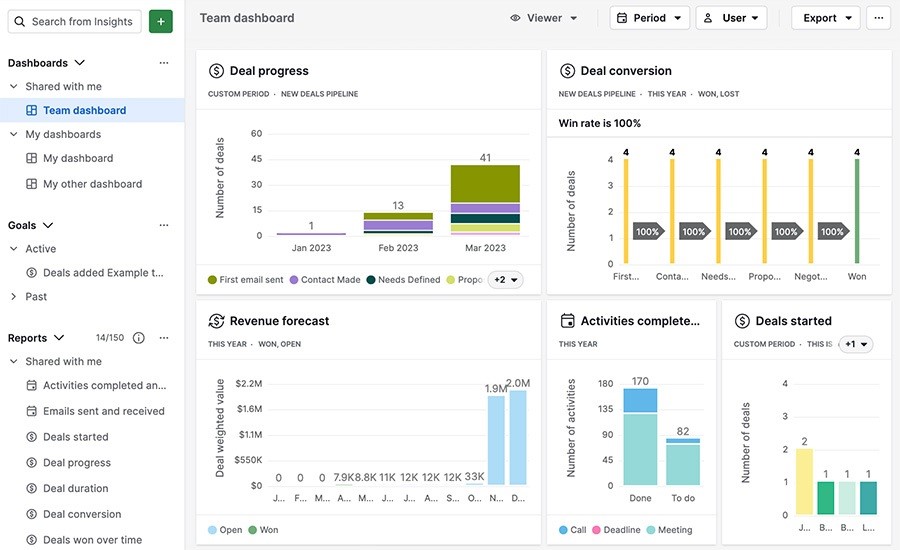
Pipedrive is a CRM designed to keep pipeline management front and center. Its intuitive layout and productivity-focused features help sales teams work efficiently and move deals forward with less effort.
Pros
- The interface is easy to use, making onboarding and daily operations straightforward for teams of all sizes.
- The visual sales pipeline provides a clear overview of deals and their stages, helping teams prioritize effectively.
- Automation features, including email sequences and task workflows, streamline sales processes and reduce manual tasks.
- Reporting and analytics tools allow teams to track performance and forecast revenue accurately.
- An extensive marketplace with over 500 integrations enables businesses to connect with a wide range of third-party applications.
- Customer support is strong, with 24/7 chat and email access, while live and phone support are available depending on the plan.
Cons
- Higher-tier plans can become expensive, especially for smaller teams.
- Customization options are more limited compared to some more complex CRMs.
- Certain advanced features are only included in the higher-tier plans.
Pricing
- Essential: $14 per user/month
- Advanced: $39 per user/month
- Professional: $49 per user/month
- Enterprise: $79 per user/month
4. Zoho CRM
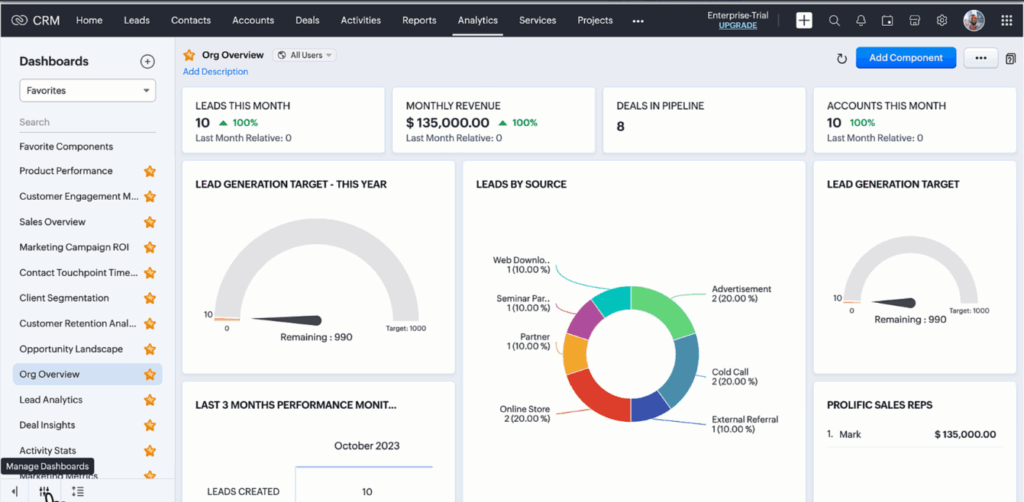
Zoho CRM combines sales, marketing, and customer support in a single platform. It includes workflow automation in its lower-tier plans and also offers an AI assistant, Zia, for lead prediction and insights. Businesses using other Zoho applications can integrate them easily, since Zoho CRM is part of its broader software suite, Zoho One.
Pros
- A free plan is available for up to three users, making it ideal for startups or very small teams.
- Automation tools help simplify everyday sales tasks, saving time and reducing manual effort.
- The platform is highly customizable, allowing businesses to adjust modules and fields to match their unique processes.
- Zoho CRM integrates with over 600 applications, including popular tools like Google Workspace and Microsoft 365.
- The AI assistant, Zia, provides predictive insights and smart recommendations to guide sales decisions.
- The interface is intuitive, so teams can start using the platform quickly without a steep learning curve.
Cons
- Some advanced features are only included in the higher-tier plans.
- Customization may require technical knowledge for more complex setups.
- The mobile app could be more user-friendly.
Pricing
- Standard: $14 per user/month
- Professional: $23 per user/month
- Enterprise: $40 per user/month
- Ultimate: $52 per user/month
5. Copper CRM
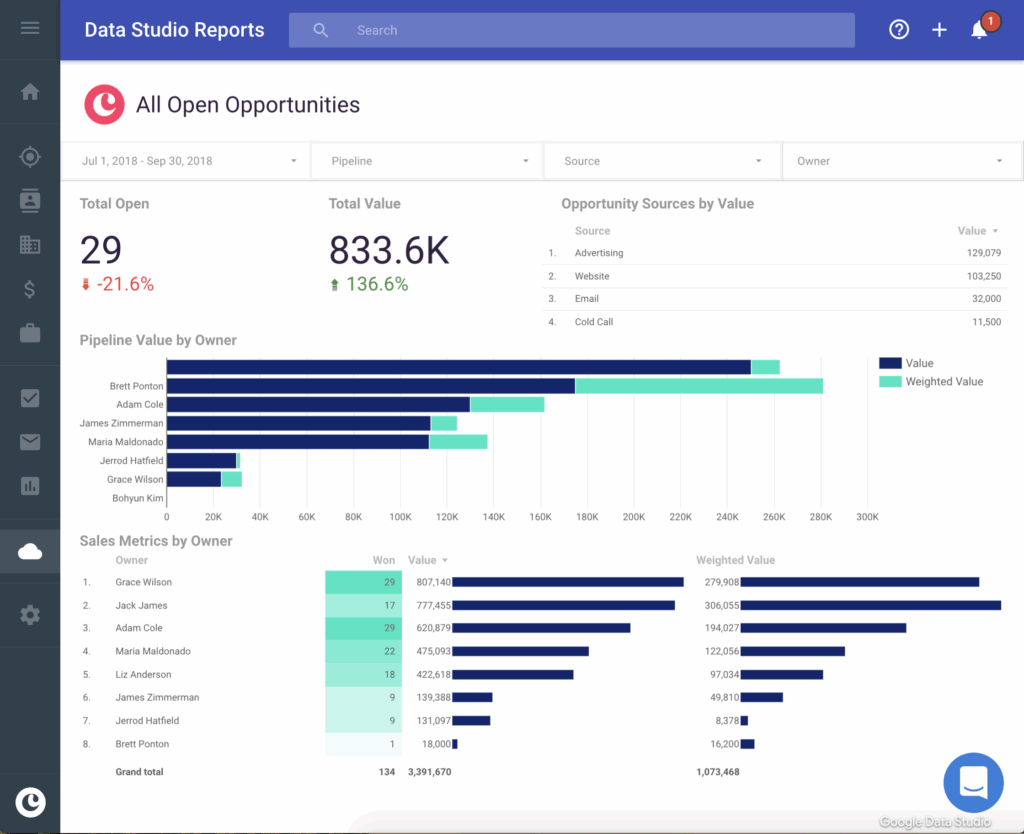
Copper CRM is built for teams that rely on Google Workspace, making it feel like a natural extension of the tools your team already uses. By automatically pulling in emails, meetings, and files, it helps sales teams stay organized and focused on deals. With pipelines, task automation, and reporting, Copper offers a streamlined approach to managing sales activities.
Pros
- Integration with Google Workspace is seamless, providing a familiar experience for users.
- Pipelines and workflows can be customized to match specific business processes.
- Task automation reduces manual data entry and helps teams work more efficiently.
- Reporting and analytics tools give insights that support data-driven decision-making.
- The platform facilitates collaboration and communication across teams.
- A mobile app allows team members to manage CRM activities on the go.
Cons
- Advanced features and customization options come with a learning curve.
- Native integrations outside the Google ecosystem are somewhat limited.
Pricing
- Starter: $12 per user/month
- Basic: $29 per user/month
- Professional: $69 per user/month
- Business: $134 per user/month
6. SugarCRM
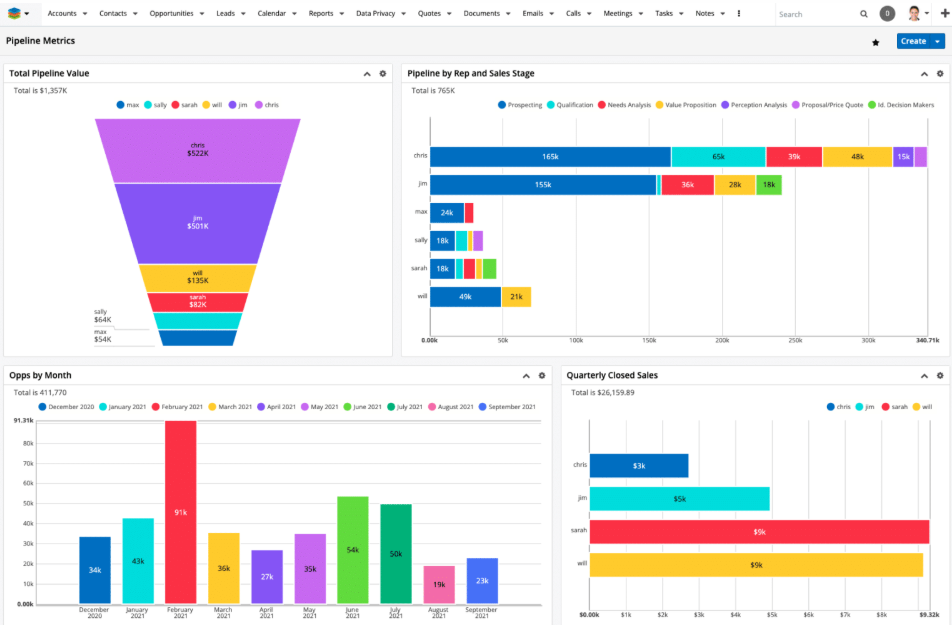
SugarCRM started as an open-source platform and transitioned to proprietary software in 2014. One of its key advantages is that it’s available both on-premises and in the cloud. Offering solutions for sales and marketing, SugarCRM serves over 2 million users across 160 countries.
Pros
- The platform is highly customizable and flexible, allowing businesses to tailor it to their processes.
- The user interface is intuitive and visually appealing.
- Reporting features are robust, providing valuable insights for decision-making.
- Implementation is relatively quick compared to some other enterprise CRMs.
Cons
- Higher-tier packages can be expensive.
- Automation features are somewhat limited.
- The platform can be complex to learn and requires time to master all functionalities.
Pricing
- Sell: $49 per user/month
- Serve: $80 per user/month
- Enterprise: $85 per user/month
7. Freshsales (Freshworks CRM)

Freshsales, part of the Freshworks suite, is a CRM designed for medium-sized businesses looking to streamline sales and customer management. It is particularly popular among companies in the hotel, e-commerce, and real estate sectors, and serves over 50,000 clients, including brands like Honda, Fiverr, and Pearson.
Pros
- Offers strong sales force automation to help teams manage leads and deals more efficiently.
- Integrates seamlessly with other tools in the Freshworks ecosystem.
- Provides customizable features to adapt the CRM to different business processes.
- Offers reliable customer support to resolve issues quickly.
- Pricing is affordable, making it accessible to growing businesses.
Cons
- Forecasting capabilities are somewhat limited.
- Load times can be slow when accessing large datasets.
- Functionality may vary across devices, leading to occasional inconsistencies.
Pricing
- Free: $0 per user/month
- Growth: $29 per user/month
- Pro: $69 per user/month
- Enterprise: $125 per user/month
Where LeadSquared Stands Out
Here’s how LeadSquared stands out in relation many other CRMs in its domain:
Supports high-velocity sales
LeadSquared automates lead capture, distribution, and nurturing, helping sales teams stay organized and focus on the most promising opportunities.
Field sales and call center friendly
The platform accommodates both field sales teams and call centers, allowing customer-facing teams to work effectively whether in the office, on the road, or on calls.
Straightforward setup
Compared to some larger CRMs, LeadSquared can be deployed quickly with less complexity, helping teams start using the system sooner.
Compliance and security
LeadSquared handles data securely and helps businesses remain audit-ready, supporting U.S. compliance standards such as SOC 2, HIPAA, and CCPA.
AI assistance with Lexi
LeadSquared’s in-house AI assistant, Lexi AI, provides call sentiment analysis, reminders, and relevant talking points, offering practical guidance to make sales interactions more effective.
Conclusion
Choosing the right CRM can have a significant impact on how your business manages leads, sales, and customer relationships. While there are many capable CRM solutions in the U.S., each offers different strengths. Some excel in automation, others in reporting, integrations, or field sales support.
LeadSquared stands out by providing a balanced combination of automation, ease of use, and practical features for both field and office-based teams, while keeping data secure and compliant with U.S. standards. Its AI assistant, Lexi, adds an extra layer of support to help sales teams stay organized and focused.
For businesses looking to streamline their sales processes and see how a CRM can work in practice, booking a demo with LeadSquared is a practical next step. Experiencing the platform firsthand will help know if it aligns with your team’s workflows and goals.
FAQs
What is CRM software and why do U.S. businesses need it?
CRM (Customer Relationship Management) software helps businesses manage interactions with leads, customers, and prospects in one central system. In the U.S., where competition is high and customer expectations are evolving, CRMs help streamline sales, marketing, and customer support. By tracking leads, automating workflows, and providing insights, CRMs allow teams to work more efficiently and improve customer satisfaction
How do I choose the right CRM for my business?
Choosing the right CRM depends on your team size, business processes, and priorities. Consider ease of use, automation capabilities, integration with existing tools (like Google Workspace or Microsoft 365), scalability, and compliance standards. Evaluating these factors helps ensure the CRM fits your workflows and delivers measurable benefits.
What are the key benefits of using a CRM?
CRMs centralize customer data, automate repetitive tasks, and provide insights into sales and marketing performance. They help teams track leads, monitor pipeline stages, and improve communication. For U.S. businesses, this translates into faster sales cycles, higher conversion rates, and more informed decision-making.
Can small businesses benefit from CRM software?
Yes. CRMs are not just for large enterprises—small and mid-sized businesses in the U.S. can use them to stay organized, manage leads efficiently, and grow systematically. Many platforms, including LeadSquared, offer tiered pricing and features suitable for smaller teams, making it accessible without overwhelming resources.
What makes LeadSquared different from other CRMs?
LeadSquared is designed to support high-velocity sales teams and field operations, combining automation, ease of setup, and compliance with U.S. standards. Its AI assistant, Lexi, helps sales reps prioritize tasks and interactions. While it offers comparable features to other CRMs, its workflow-centric approach and flexibility make it practical for both office-based and mobile teams.
Are CRMs suitable for remote and distributed teams?
Absolutely. Modern CRMs provide mobile apps, cloud access, and collaboration features, making it easier for distributed teams to stay connected. Teams can update leads, track interactions, and monitor pipelines from anywhere, ensuring sales and support processes continue smoothly regardless of location.
How important is integration with other tools?
Integration is crucial. CRMs that connect with email platforms, collaboration tools, marketing software, and productivity apps reduce duplicate work and maintain a single source of truth for customer data. Many U.S. businesses rely on integrations with Google Workspace, Microsoft 365, Zoom, and Slack to keep their workflows efficient.
How secure are CRM platforms for U.S. businesses?
Security and compliance are key considerations. Reputable CRMs follow industry standards such as SOC 2, HIPAA, and CCPA to protect sensitive customer data. Platforms like LeadSquared emphasize secure data handling and audit readiness, ensuring businesses can manage compliance obligations confidently.
Can a CRM help improve customer relationships?
Yes. By consolidating customer data, tracking interactions, and providing timely follow-ups, CRMs enable teams to deliver more personalized and consistent experiences. This leads to stronger relationships, higher satisfaction, and improved retention over time.
How do I get started with a CRM system?
Start by identifying your key business needs, such as sales automation, lead tracking, or marketing integration. Evaluate CRM options based on usability, features, and scalability. Many platforms, including LeadSquared, offer demos or free trials, allowing teams to test workflows and see how the CRM fits before making a commitment










